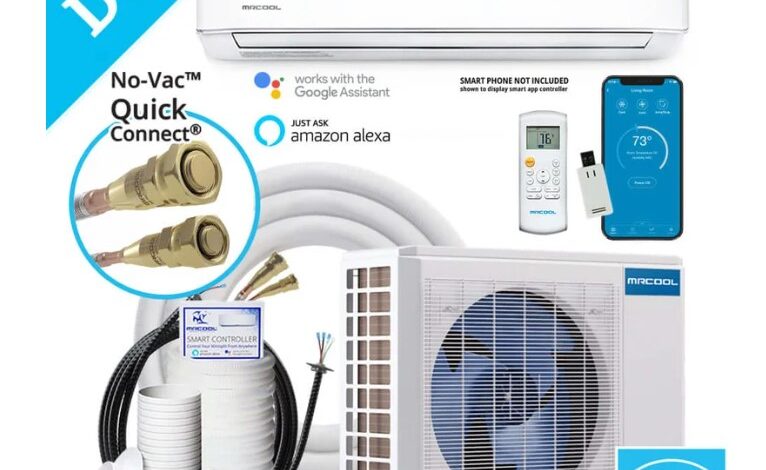Efficient Comfort: Exploring the Advantages of Ducted Heat Pump Systems

In today’s world, where energy efficiency and home comfort are paramount concerns, ducted heat pump systems emerge as a promising solution. These systems offer a versatile and efficient way to heat and cool homes, ensuring optimal comfort throughout the year. Let’s delve into the intricacies of ducted heat pump systems and explore their numerous advantages.
Understanding Ducted Heat Pump Systems
What Are Ducted Heat Pump Systems?
Ducted heat pump systems, also known as central heating and cooling systems, consist of an outdoor unit and indoor ductwork. These systems utilize refrigerant to transfer heat energy between indoor and outdoor environments, providing both heating and cooling functionalities.
How Do Ducted Heat Pump Systems Work?
Ducted heat pump systems operate on the principle of heat transfer. During the winter, the outdoor unit extracts heat from the surrounding air and transfers it indoors. In the summer, the process is reversed, with the indoor unit removing heat from the indoor air and releasing it outdoors.
Components of Ducted Heat Pump Systems
- Outdoor Unit: This component houses the compressor and condenser coil, responsible for extracting and releasing heat.
- Indoor Unit: Typically located in the attic or utility closet, the indoor unit contains the evaporator coil and blower fan.
- Ductwork: Ducts distribute conditioned air throughout the home, ensuring uniform heating and cooling.
Advantages of Ducted Heat Pump Systems
Energy Efficiency
Ducted heat pump systems are renowned for their energy efficiency. By leveraging heat transfer mechanisms, these systems consume less energy compared to traditional heating and cooling methods, resulting in lower utility bills and reduced environmental impact.
Whole-House Comfort
One of the primary advantages of ducted heat pump systems is their ability to provide whole-house comfort. Unlike individual room heaters or window air conditioners, ducted systems ensure consistent temperatures throughout the home, eliminating hot or cold spots.
Year-Round Functionality
Ducted heat pump systems offer year-round functionality, providing both heating and cooling capabilities. This versatility makes them ideal for regions with fluctuating temperature extremes, allowing homeowners to stay comfortable regardless of the season.
Zoning Options
Modern ducted heat pump systems often feature zoning capabilities, allowing users to divide their homes into separate temperature zones. This enables personalized comfort control, with occupants able to adjust temperatures according to individual preferences.
Quiet Operation
Unlike traditional HVAC systems, which can be noisy and disruptive, ducted heat pump systems operate quietly and efficiently. The indoor unit’s insulated cabinet and variable-speed fan contribute to a peaceful indoor environment, free from loud mechanical noises.
Installation and Maintenance
Installation Process
The installation of a ducted heat pump system typically involves several steps:
- Assessment: A professional HVAC technician assesses the home’s layout and heating/cooling requirements.
- Ductwork Design: Custom ductwork is designed to distribute conditioned air evenly throughout the home.
- Equipment Installation: The outdoor and indoor units are installed, along with the necessary ductwork and controls.
- Testing and Calibration: The system is tested to ensure proper operation and calibrated for optimal performance.
Maintenance Requirements
Regular maintenance is essential to ensure the longevity and efficiency of ducted heat pump systems. Key maintenance tasks include:
- Filter Replacement: Regularly replacing air filters helps maintain indoor air quality and system efficiency.
- Coil Cleaning: Periodic cleaning of the evaporator and condenser coils prevents dust and debris buildup, optimizing heat transfer.
- Refrigerant Check: Ensuring proper refrigerant levels is crucial for system performance and efficiency.
- Professional Inspection: Annual inspections by qualified technicians can identify potential issues early and prevent costly repairs.
Conclusion
Ducted heat pump systems offer a comprehensive solution for home heating and cooling needs, combining energy efficiency, whole-house comfort, and year-round functionality. With their numerous advantages and versatile applications, these systems are poised to revolutionize the way we heat and cool our homes for years to come.
Ready to upgrade your home comfort with a ducted heat pump system? Contact Peach Heat and Cool today for expert installation and personalized service. Experience year-round comfort and energy.
Frequently Asked Questions FAQs
- Are ducted heat pump systems suitable for all types of homes?
Ducted heat pump systems can be installed in most homes, including single-family houses, apartments, and condominiums. However, the feasibility of installation depends on factors such as available space for ductwork and the home’s layout. Consultation with an HVAC professional can help determine the best heating and cooling solution for your specific property.
- What is the lifespan of a ducted heat pump system?
The lifespan of a ducted heat pump system can vary depending on factors such as usage, maintenance, and environmental conditions. On average, well-maintained systems can last between 10 to 15 years. Regular maintenance, including filter replacement and coil cleaning, can help extend the system’s lifespan and ensure optimal performance.
- Are ducted heat pump systems energy efficient?
Yes, ducted heat pump systems are known for their energy efficiency. By utilizing heat transfer technology, these systems can provide heating and cooling using significantly less energy compared to traditional HVAC systems. This efficiency can lead to lower utility bills and reduced environmental impact over time.
- Can ducted heat pump systems be retrofitted into existing homes?
Yes, ducted heat pump systems can often be retrofitted into existing homes, especially if there is already ductwork in place for a central heating or cooling system. However, retrofitting may require modifications to the ductwork and installation of new equipment. A professional HVAC technician can assess your home’s suitability for retrofitting and provide recommendations accordingly.
- Do ducted heat pump systems require regular maintenance?
Yes, regular maintenance is essential to ensure the continued efficiency and performance of ducted heat pump systems. Maintenance tasks may include filter replacement, coil cleaning, refrigerant checks, and professional inspections. Following a maintenance schedule recommended by the manufacturer or HVAC technician can help prevent costly repairs and prolong the system’s lifespan.




